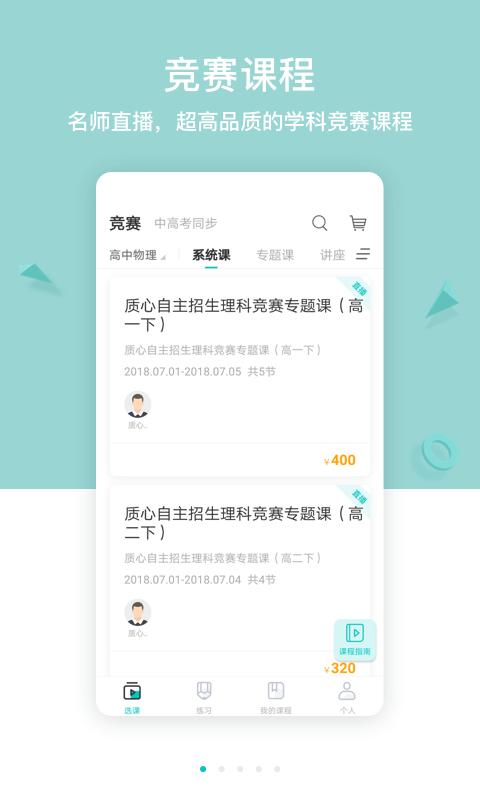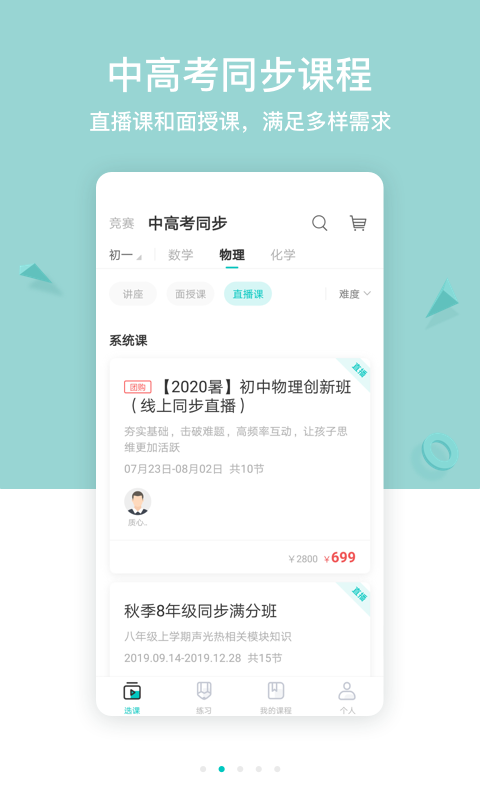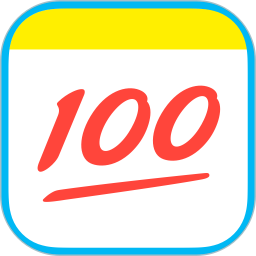Features of centroid online software
Strong professionalism: The courses are taught by competition gold medal coaches and Qingbei top students. The topics have been strictly reviewed and are close to real competitions.
Systematic learning: forming a closed loop from knowledge input (courses) to ability output (mock exams) to avoid the "fragmented learning trap".
Data-driven: Help students improve accurately through intelligent diagnosis, error management, and progress tracking.
Community Ecology: Connect national competition students to create an atmosphere of mutual help and reduce the loneliness of self-study.

Centroid onlineSoftware Highlights
1. Learning path planning: personalized growth plan
Intelligent diagnosis:
Complete the subject ability test when using it for the first time (such as "Basic Test of Mathematics Competition: Comprehensive Questions on Algebra, Geometry, and Number Theory").
System generation capability report: mark the advantageous modules (such as "strong in inorganic chemistry in chemical competitions") and weak items (such as "organic reaction mechanism needs to be strengthened").
Recommended paths:
Recommend courses, question banks, and simulation tests based on the diagnosis results (for example, "It is recommended to study the 'Physics Competition Mechanics Advanced Course' first, and then study the 'Momentum Topic Question Bank'").
Dynamic adjustment: Update recommendations as learning progresses (for example, "After completing the course 'Combinatorics for Mathematics Competitions,' recommend 'Graph Theory Topic'").
2. Multi-terminal synchronization: study anytime, anywhere
App side:
Fragmented learning: use commuting, time between classes to study questions, and watch micro-lectures (such as "5-Minute Chemistry Competition Periodic Table Shorthand").
Offline download: Course videos and question banks can be cached locally (such as "Download the live physics competition class and watch it on the subway").
Web page:
Large-screen operation: more suitable for long-term study and simulation exams (such as "Complete a 3-hour physics competition simulation paper on the computer").
Multi-window management: View the course, question bank, and wrong question book at the same time (such as "Play the live broadcast of the math competition on the left, record notes on the right").
3. Data-driven learning: visualizing progress trajectories
Study time statistics:
Record the daily and weekly study time (for example, "Study for the physics competition for 12 hours this week, 30% more than last week").
Generate a study calendar: Mark efficient study periods (such as "8-10 pm in the evening with the highest accuracy in solving problems").
Knowledge point mastery:
Use a progress bar to display (for example, "The mastery of organic chemistry in the chemistry competition is 75%, and the 'stereochemistry' sub-module needs to be strengthened").
Related courses and topics: Click on the progress bar to jump directly to learning resources (for example, "Click on the 'Physics Competition Electromagnetic Induction' in 'Not Mastered' to recommend 3 related courses").

Centroid onlineFunction introduction
1. Staged competition courses: systematic knowledge building
Course Category:
Introductory course: suitable for students with zero foundation or new involvement in competitions (such as "Introduction to Physics Competitions: From Textbooks to Competition Thinking").
Advanced courses: covering the core knowledge points of the competition (such as "Combinatorics Topics in Mathematics Competitions" and "Organic Reaction Mechanisms in Chemistry Competitions").
Sprint courses: Intensive training before exams (such as "Special breakthroughs in experimental questions for physics competitions" and "High-frequency test points for genetics in biology competitions").
Pre-university courses: Early exposure to college content (such as "Basics of Calculus" and "Principles of General Chemistry"), paving the way for competitions and strong foundation plans.
Course format:
Live class: real-time interaction, support for asking questions and solving problems through mic (such as "Live Q&A for Physics Competition every Wednesday night").
Recorded lessons: can be watched repeatedly, suitable for checking and filling in gaps (such as "Review of Informatics Competition Algorithms: Detailed Explanation of Dynamic Programming").
Graphic lessons: fragmented learning (such as "Chemistry Competition Periodic Table Shorthand Skills").
Featured design:
Knowledge map: Each course is equipped with a mind map to mark the relationship between knowledge points (such as the chain of "Physics Competition Mechanics → Energy → Momentum").
Difficulty grading: The questions are graded according to "Basics→Improvement→Competition" to gradually improve abilities (such as "Mathematics Competition Number Theory Module: From Divisibility to Congruence Equations").
2. Intelligent question bank: accurate question writing and wrong question management
Question source:
Past competition questions (such as "National Middle School Physics Competition Final Questions").
Independent proposition team original questions (simulation competition style).
Internal questions from cooperative prestigious schools (such as "Practice questions for the Physics Competition Training Team of the High School Affiliated to Renmin University of China").
Smart volume formation:
Compose the paper according to knowledge points: Select the topic "Organic Synthesis of Chemistry Competition" to generate 10 targeted exercises.
Group papers according to difficulty: set "increase level", and the system will screen out questions that require leaping thinking (such as "Math Contest Combined Geometry Problems").
Mock examination paper: restore the competition duration and question type distribution (such as "3-hour physics competition simulation paper").
Error management:
Automatically collect wrong questions and mark the reasons for the errors (such as "calculation errors" and "blurred concepts").
Generate a wrong question book and support review by knowledge points and time (such as "Wrong question in this week's physics competition: conservation of momentum").
Recommend intensive training on similar questions (for example, "The wrong question involves the 'Lorentz force', recommend 3 related electromagnetic questions").
3. Mock exams and rankings: test learning effectiveness in practice
Fully realistic simulation:
Online competition simulation tests (such as the "Center of Mass Cup Mathematics Competition Simulation Competition") are held regularly, and the difficulty and duration of the questions are consistent with those of the real competition.
Supports single-person self-test or team PK (such as "invite classmates to participate in chemistry competition simulation competition").
Performance analysis:
Generate detailed reports: score rate, weak knowledge points (such as "the score rate of the electromagnetic section of the physics competition is 60%, which is lower than the average").
National ranking comparison: Check your position among your peers (such as "the top 10% in the country in the math competition simulation test").
Historical performance tracking: Compare the progress of multiple exams (such as "the physics competition simulation test ranking improved by 200 places within 3 months").
Reward mechanism:
The top ranked students can receive electronic certificates, course coupons or physical prizes (such as competition textbooks and experimental equipment).
Outstanding candidates have the opportunity to be recommended to the training teams of prestigious cooperative schools (such as the "Joint Training Program between Quality Center and Tsinghua High School").
4. Q&A with famous teachers and community interaction: solving learning bottlenecks
1 to 1 Q&A:
Submit a question (such as "This physics competition question uses conservation of energy or momentum?") and it will be answered by the competition coach or top student within 24 hours.
Supports uploading pictures and handwritten formulas (such as "take photos and upload structural formula questions for chemistry competitions").
Live Q&A class:
At a fixed time every week, famous teachers will focus on answering high-frequency questions (such as "Common Misunderstandings in the Number Theory Module of Mathematics Competitions").
Students can submit questions in advance, and the teacher will demonstrate the problem-solving process on-site (such as "Use the blackboard function to write the derivation steps of the physics competition").
Learning community:
Competition experience sharing: Users post their preparation experience (such as "How to balance competition and college entrance examination homework?").
Resource exchange: Upload/download learning materials (such as "Physics Competition Experiment Video Collection").
Group study: Find partners with the same goal (such as "Looking for a partner in the Beijing regional chemistry competition, and answer questions offline every week").
FAQ
Videos load slowly or freeze: This may be caused by an unstable network connection or insufficient device performance. It is recommended to check the network connection or close other programs that consume network resources. At the same time, ensure that the device performance meets the software operation requirements.
Unable to watch the live class: If the live class cannot be watched, it may be because the class has not started, has ended, or is caused by network problems. You can check the course schedule to confirm whether classes are taking place. At the same time, check whether the network connection is normal.
Centroid online update log
1. Sweep the bug out and carry it out to the end
2. The most stable version ever
Huajun editor recommends:
Centroid Online has always been the most commonly used software by most netizens. Huajun Software Park also hasABCmouse,Homework help live class,Researcher,Uighur version of Driving Test Guide,sky classroomIt is also a software that is very popular among netizens. You can download it from Huajun Software Park!





 You may like
You may like

























Useful
Useful
Useful